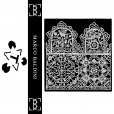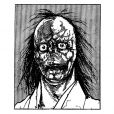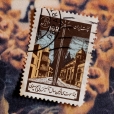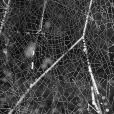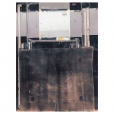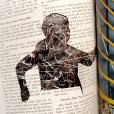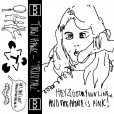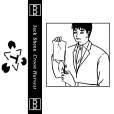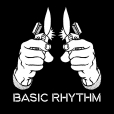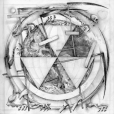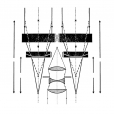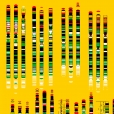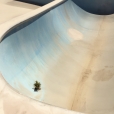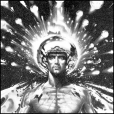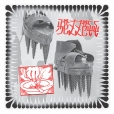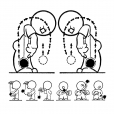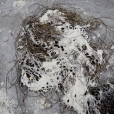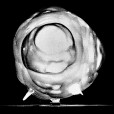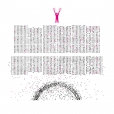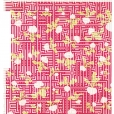Your basket is empty

‘We first became aware of the Florence-based composer Marco Baldini via the incredible Another Timbre label.
‘His albums, Vesperi and Maniera, blew us away. Maniera, Marco’s second album for the label consists of seven chamber works for strings, beautifully played by Apartment House. If you haven’t heard it go straight to Another Timbre’s Bandcamp and check it out! Vesperi, Marco’s first release on Another Timbre, from around a year before is also absolutely unmissable, it’s comprised of three pieces derived from works by 16th century Italian composers alongside original compositions.
‘Both albums have provided much needed calm in turbulent times. Marco kindly accepted our invitation to compile a mixtape, and here it is! Thank you so much, Marco!’
Beau Wanzer + Rezzett = maximum worries squared. Five frazzlers for all us nutters in the dance. Borez they izn’t.
A thought-provoking, deeply enjoyable consideration of displacement and dislocation, and abiding but adaptive cultural memory, this fourth collaboration mashes expert, haunting samples of the classical Iranian pop of greats like Andy, Hayedeh, and Fereydoun Farrokhzad into tough, quick-fire beat-downs.
A terrific, fresh techno EP by Robin Stewart. Minimalist and dubwise, but fizzing with physical energy, and loaded with thrills and spills, like fairground ghost trains clanking and rattling through Rome, at a clip.
Check it out!
‘Regrows dub techno from the seeds,’ says Boomkat, ‘with a set of twisted warehouse melters that apply advanced dub logic to pointillistic technoid rhythms.
‘The off-grid, lolloping kicks are interesting enough on their own, but it’s how Stewart treats them that makes opener Stomach pop, sinking them in swirling, lysergic goop rather than drowning them out with rinsed tape FX. The oscillating, demonic subs that heave just beneath the surface don’t muddy things completely, they crack the sunroof on the top end, letting the industrialized foley clanks and hoarse vocaloid stutters boot us towards an unexpected destination. And although Compact is more trad on the surface — a gated peak-time roller, natch — Stewart’s canny processing makes the kicks tickle more than they thump. Everything builds up to the title track, where Stewart freezes mind-rinsing dissociated echo spirals into their own rhythmic forms that push against the relentless double-time thuds, weaving phantom polyrhythms out of thin air while spectral voices whisper overhead.’
‘The surrealist, psychedelic brain-burps of notorious all-caps-tweeting wind-up-merchant Louis Johnstone aka Wanda Group. Twenty-six congealed morsels of spur-of-the-moment
sound-art executed with genuine economy of means, namely… a phone. An impulsive, scatter-brained trip into the inner circles of regional weirdness, secreting a creeping unease which really gets under your skin. Fragments of aural rubble haphazardly cohere into galvanising spacial tones and textures, punctured by Johnstone’s garbled Essex rantings. The long-distance stare of warbled tape loops is abruptly fractured by a drunken sing-along in a care home for the elderly. As hallucinogenic takes on the utterly mundane, there’s an obvious kinship with Lambkin’s nocturnal, straight-to-dictaphone sound-pieces. Dan Johannsen’s splintered classical collages on that PIG tape and the suburban soliloquies of Regional Bears alumnus Russell Walker also feel closely aligned.’ (All Night Flight)
With an A4 riso insert.
‘Just over half an hour of Luke Wyatt nattering — talking over, against, and to himself — interspersed with slyly deployed SFX, and quotes from his own musical recordings. A wild, uncannily cohesive, funny-sad excursion, issuing from a childhood memory, and somehow taking in the ’86 Mets, WIlliam Rehnquist, and Boy Scout regalia, amongst much else, in a hilarious, poignant affirmation of the spiritual prequisite of self-expression.’
Grieving, hushed, involving music for voices, field recordings, and white noise, performed by Kantos.
‘Palestre is a study of higher-dimensional spaces and altered states of consciousness. It explores parallel dimensions and temporal anomalies from a perspective that blends mythology, modern physics, ADHD, transcendental music and club culture.
‘Sciogli Assurdi was recorded between art galleries, clubs, squats, and folkloric festivities in 2018.’
“This is killer,” says Ben UFO.
The Observer raved about a recent performance of this at the Wigmore Hall: ‘Solo for Cello (and fixed audio) was the highlight, an extensive, ghostly work played by Apartment House’s indefatigable artistic director, Anton Lukoszevieze. Imagine a baroque dance suite — with the familiar figurations of arpeggios, quick finger work and string crossing — played muted and whispered a few galaxies away, and you get the idea.’
The performer of this recording, Anton himself has written that Solo is ‘an extended exploration of the resonant body of the cello, but also a kind of flickering, glitchy and incessant ‘moto perpetuo’ of extreme intensity and a delicate beauty. The cello has a particular scordatura tuning, which creates an enigmatic harmonic ‘space’ to its sounding throughout the work. As the cellist constantly bows the heavily muted cello with varied arpeggiated freneticism, the instrument emits a particular halo of harmonic resonances creating a spectral and ghostly effect, deceptive and illusory. The work gradually morphs into different sections, each with their own particular motivic identity, at times accompanied by an audio playback of various densities. The latter sections of the work have a baroque-like lightness and ornamental quality, but do not allay the dramatic incisiveness of the the work, which ends with a final enigmatic spasm of sounds.’
And the composer Sheen advised the mastering engineer that ‘the cello is muted with a very heavy metal mute which thins out the sound massively, and Anton plays a super-light bow with extreme flautando, which creates a strange thin wispy sound. I’d like it to sound as distant and liminal as possible, with a lot of bow sound and strange resonances from the harmonics of the cello. With the exception of a few obvious spots where it gets louder and fuller, there should be as little ‘core’ to the sound as possible, but as many strange resonances as possible. The words we used a lot of in rehearsals were ‘baroque’ and ‘internal’ and ‘light’. I hope this helps.’
Transfixing, and good for ears; with luminous strands of Marin Marais, Derek Bailey, and Eliane Radigue.
Check it out!
TTT TTT TTT TTT TTT TTT TTT TTT TTT TTT TTT TTT TTT TTT TTT TTT TTT TTT TTT TTT TTT TTT TTT TTT TTT TTT TTT TTT TTT TTT TTT TTT TTT TTT TTT TTT TTT TTT TTT TTT TTT TTT TTT TTT TTT TTT TTT TTT TTT TTT TTT TTT TTT TTT TTT TTT TTT TTT TTT TTT TTT TTT TTT TTT TTT TTT TTT TTT TTT TTT TTT TTT TTT TTT TTT TTT TTT TTT TTT TTT TTT TTT TTT TTT TTT TTT TTT TTT TTT TTT TTT TTT TTT TTT TTT TTT TTT TTT TTT TTT
The one-hundredth Trilogy!
Hats off to an amazing, uncompromising run of killer music and lavishly brilliant artwork. Bangers and magic like dirt.
21 gun salute.
Prime Cuts from the legendary Scratch Perverts crew with an upful six-tracker, full of life and intelligence, and teeming with fidgety, DIY, turntablist energy.
For us it’s a bit like a raid on the racks at Honest Jons, over the decades… but fresh and bright. It kicks off with a headlong garbling of eighties jazz-funk, complete with synths, a vocoder, and some incipient Herbie, all sagging woozily into some nuts pitch control, before a mean beat-down. Some dubwise Channel One follows up, with almightily anthemic snatches of melody and unmistakable chords, almost breaking down under a barrage of skittering effects, scratching, laser-fire, strangulated melodica, and cowbell. Then three excursions in classic Detroit techno: moody electro funk, with a sprinkling of Harold Faltermeyer; hard-grooving minimalism, with a dash of It Takes Two; then a more industrial outing, with clattering percussion and gobbling synth. Finally an ambient interlude — overcast but twinklingly ambivalent — to close.
Ace. A lot of fun. Check it out.
Snoopy is hard to follow up. The same brilliant musicality is lavished on Orange — a combination of unmistakably original, skittering drum programming, startlingly fresh instrumental interjections, creepily invocatory voices, and dubwise treatments — giddily imbued with the dark arts of ritual and seance. But Orange is more gripping, focussed and urgent, more intense and ambitious. Next level.
Its first quarter presents a trio of forays in suspense.
Bassline squares up like an epic psych-funk grinder, with a moody guitar line traversed by ticking drum patterns and faint electric crackle. In no time the guitar is staggering and stammering under the duress of echo and distortion, and over-run with percussive electronics and the first of the voices massing in the music’s head. The mood has quickly become more trepidatious. We’re deeper underground; it’s gloomier, wetter.
Shred propulsively ratchets up the tension and menace. Glazily tentative xylophone is played against slashing, nervy cello. The voices are more strangulated and sick now. Flutes and chimes evoke the same kind of beautiful, contaminated efflorescence which is pictured on the LP’s front cover.
Voice Of The Spider makes easier progress across this cavernous, shadowy, dripping terrain, with funky pads and Nasty, eighties, No Wave electric bass; woozy chimes, non-plussed keys, singing-in-tongues.
Pink Mist marks an arrival, or unbottling, with annunciatory church-organ and choral voices from the off, and a newly relaxed, head-nodding kosmische rhythm.
Mandarin is a short, beat-less and voice-free interlude for piano and bass. It’s reflective and nostalgic, ambivalent and inconclusive, with a lovely snatch of melody. A bridge half-way.
Would You Like A Vampire is a triumphant, mesmerizing go at New Folk, with strummed acoustic guitar, descant song, and jazzily restless drum programming (including a tasty bass-bin trembler). Amazingly, Conrad Standish is joined at the mic by none other than Bridget St John. Together they sing ‘Earth is Paradise’ so repeatedly and tremulously — and the song is cut off so abruptly at the end — it seems as if the verb is teetering on the past tense, and hymn fading into valediction and catastrophe.
In the same line of thought, Storm Rips Banana Tree begins idyllically enough, with a CS-&-Kreme-style raga… before something like an immense, obliterative drill starts up. Harpsichord and organ — by James Rushford — and flutes, and clapping, distant chanting and insectile percussion steadily leaven the dread, till finally all that is left is lapping water.
It’s an epic, deeply immersive, compelling, thought-provoking, twenty-minute finale… the coup de grâce.
A second killer Trilogy EP from DJT in Japan, advancing the legacy of Chain Reaction.
Serious, emotionally reined-in music; structurally minimal, linear and open-ended, without the puppeteering routines of most dance music… but all the more enthralling and grooving, with hefty bass. The sense of monumental, weather-distressed, darkening dread is counter-balanced by this forward momentum, and expertly dubwise light-and-shade, with layered detail.
The reverberative, gong-like tolling of the opener gives way on the flip to machines starting up in a cavernous space, like vast beating wings, with a tumping bottom end, over nine minutes.
In-between is a more atmospheric and tentative interval, with slowly roiling synths and near-and-far, morse-code percussion.
Ace.
Sparky, engaging, inventive kitchen wave — on a mission to connect with you, cheer you up, and make you dance — rolling into TTT by way of Incienso and Workshop.
Also check out Kiki’s online cooking programmes and get pickling.
Bracing portions of the screaming abdabs dressed as naked, hooligan machine-funk — fizzing, stomping, juddering and going mental in the furnace of high noon like whizzed-up children of the hydra’s teeth.

